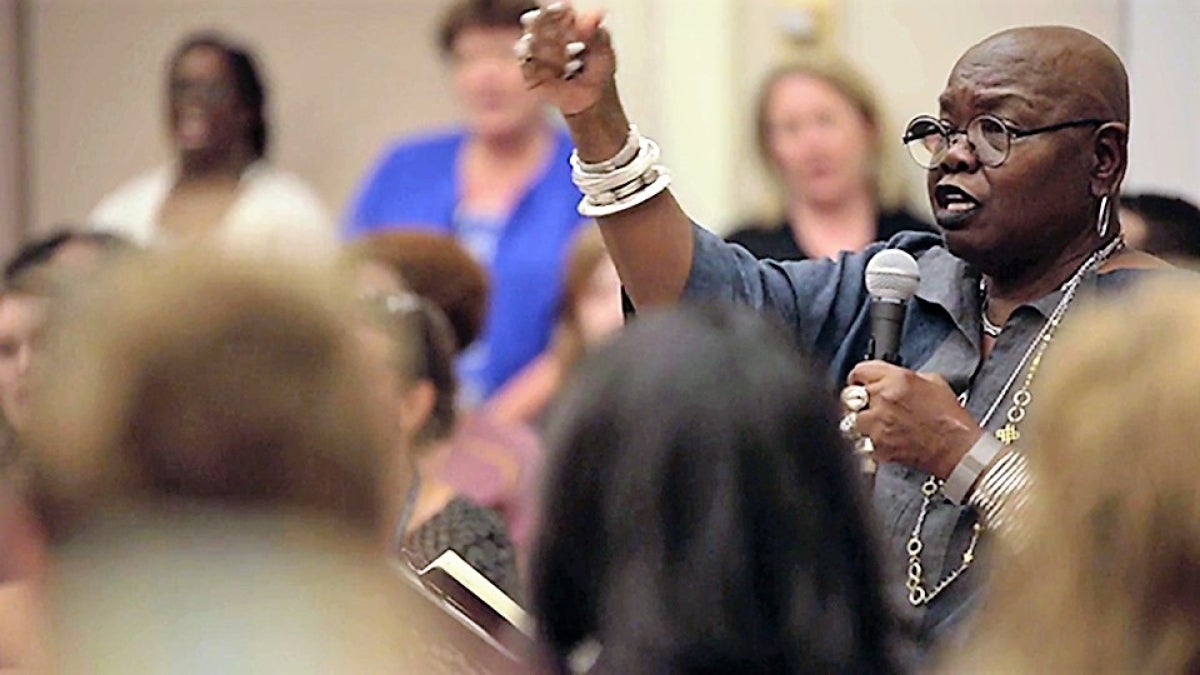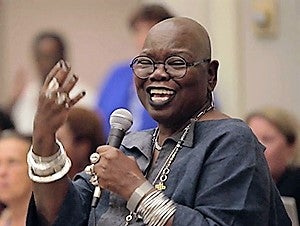ASU School of Music resident artist uses music to connect global communities

Ysaÿe Barnwell in a community sing.
Ysaÿe M. Barnwell’s pedagogy is more far-reaching than just singing music. She teaches the humanity of music-making.
“Music is infinitely functional,” Barnwell said. “It ties the whole existence of a culture together. It is the intermediary between one culture and another — music is everything.”
Barnwell teaches how to create and connect communities using the power of the human voice — one communal voice.
As the inaugural guest artist of the Herberger Institute for Design and the Arts’ Projecting All Voices initiative, Ysaÿe Barnwell helped honor, validate and advance all voices. The Projecting All Voices initiative recognizes that every person, regardless of social background, deserves an equal chance to help tell our nation’s and our world’s stories.
“Everyone's social status was thrown away during the time we spent singing,” said Hunter Langenhorst, undergraduate music and culture major. “Age, sex, sexual orientation, race, gender were irrelevant.”
During her weeklong residency Sept. 5–8 with Arizona State University's School of Music, Barnwell presented three community sing sessions and three public lectures on her creative work and inclusive community building through music.
Barnwell says that it is through the communal voice that people can begin to create and implement positive, harmonious strategies for change impacting the individual, the family, friends, the community, the country and the world.
“It is important to understand that there are different world views based on the different cultures and that people see and react to the world through their world view,” she said. “Though we are using the same words, we all look at the world through different views — our own culture’s view.”

Barnwell uses the African world view in her community building work because, she says, African music has function and purpose — it tells the story of African history, values and culture through oral tradition. Africans communicate and connect with all levels of their hierarchical world view through music that is related to life. Everything is documented through music.
When Africans were enslaved, they brought the African way of looking at life — including music — with them. As the traditional call and response music evolved, the African American spiritual was born.
Barnwell says if we listen to the music — look carefully at the lyrics and listen to the rhythms — we get to know the culture it’s from.
Carol FitzPatrick, associate professor of voice, attended Barnwell’s community sing session and lecture on world views.
“This was a life-changing experience,” FitzPatrick said. “It’s about being more open to other cultures and the exciting differences between them, and celebrating those differences rather than trying to erase them or denigrate them.”
Barnwell is passionate about using music as a catalyst for bringing people together.
“A community is created by the music and lyrics of ordinary people,” she said.
Barnwell also says that everyone can sing. In her community sing sessions and lectures, she teaches how to sing music in the African American oral tradition. Participants who cannot read music only need to hear the music to sing it. Barnwell also pioneered the use of sign language to teach people who could not hear how to sing music.
Undergraduate music education major Connor Siroky said, “The experience taught me that there are people out there who aren’t ‘artists,’ but ordinary people who are capable of creating art.”
Barnwell’s community sings incorporate four different melodies sung simultaneously in a “round.” She demonstrates all parts so participants hear every part to sing. At the end of the session, participants discover that when several voices sing different songs simultaneously, another voice emerges — “one voice.”
Sabine Feisst, professor of musicology, said, “Dr. Barnwell quickly tore down barriers between academics and non-academics, literate and non-literate musicians through a few exercises in community singing.”
“Students, faculty and staff in the School of Music said they were inspired by Barnwell’s vision of peacebuilding through music,” said Deanna Swoboda, associate professor of tuba and euphonium. “She truly elevated everyone around her, as a scholar, a musician, a person who brings people together through song. I realized the positively powerful effect that singing can bring to everyday life.”
Barnwell is a commissioned composer, arranger, singer, choral clinician, researcher, educator, actress and author. Her residency was made possible in part by a Mellon Foundation grant, the ASU Herberger Institute for Design and the Arts, and the School of Music.
More Arts, humanities and education

Honoring innovative practices, impact in the field of American Indian studies
American Indian Studies at Arizona State University will host a panel event to celebrate the release of “From the Skin,” a…

ASU alum's humanities background led to fulfilling job with the governor's office
As a student, Arizona State University alumna Sambo Dul was a triple major in Spanish, political science and economics. After…

ASU English professor directs new Native play 'Antíkoni'
Over the last three years, Madeline Sayet toured the United States to tell her story in the autobiographical solo-…